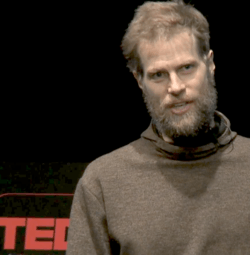Joe Betts-LaCroix
Jonathan Betts-LaCroix, (né Jonathan Betts) better known as Joe Betts-LaCroix, is an American scientist and entrepreneur known for his discoveries in biophysics and for creating the world's smallest personal computer. He is working to optimize medical research priorities in the U.S.
| Joe Betts-LaCroix | |
|---|---|
|
Joe Betts-LaCroix at TEDxSF 2011 | |
| Born |
February 26, 1962 Seattle |
| Alma mater | Harvard College |
| Occupation | Executive Director, Health Extension |
| Website | evocator.org |
Academics
Beginning in earth sciences at Harvard, Betts-LaCroix contributed to the field of long-term regulation of oxygen on Earth over multi-100 Million-year timespans, quantifying the effect of the burial efficiency of organic carbon as a feedback mechanism.[1]
At MIT, he designed and built an autonomous, robotic system that enables research into ocean circulation patterns and climate change, by operating untended for up to one year at sea on battery power and collecting hyper-pure water samples at predetermined intervals.[2]
In work at Caltech, Betts-LaCroix moved into biophysics, publishing a paper in Science that has been cited by more than 500 subsequent scientific works.[3] In this work, he, along with David Beratan and Jose Onuchic proved for the first time that electron-transfer rates in proteins are determined by the electron orbital interactions in the protein structure.[4]
Entrepreneurship
In 2000, Betts-LaCroix cofounded OQO, a computer hardware and software OEM credited by the Guinness World Records as having created the world's smallest Windows PC.[5] This created a new category of mobile computing devices between PDAs and laptops, which were initially dubbed the "Ultra Personal Computer", and which subsequently became known as the "Netbook". The device won many awards for its innovation, aesthetics and functionality.[6][7][8][9][10]
After OQO, Betts-Lacroix was active in Silicon Valley as a lecturer and mentor for CEOs of start up companies.[11]
Biotechnology & biomedicine
Betts-LaCroix has participated in the Quantified Self movement since the beginning,[12] and has given numerous presentations on aspects of self experimentation and tracking, including experiments in the 28-Hour day.[13]
In 2010 he joined startup Halcyon Molecular to lead its automation efforts. [14] Halcyon, funded by, among others, Elon Musk and Peter Thiel, attempted to sequence human DNA using electron microscopes. The underlying goal of Halcyon's work was to make meaningful progress in understanding human biology in order to improve medicine.[14]
Following the theme of improving medicine, Betts-LaCroix founded [Health Extension | http://healthextension.co] in 2012. [15] The efforts of the people working in Health Extension are motivated by recognizing that
- Most healthcare money treats age-related diseases;
- Aging is the single biggest risk factor for these diseases;
- But funding to address the biochemical processes of aging is less than 0.01% of healthcare spending—and correcting this missed opportunity to optimally assign medical research and translation priorities.[16]
See also
References
- ↑ Betts, Jonathan. "The oxygen content of ocean bottom waters, the burial efficiency of organic carbon, and the regulation of atmospheric oxygen". Retrieved 18 June 2013.
- ↑ Bell, Jory. "MITESS: a moored in situ trace element serial sampler for deep-sea moorings". Retrieved 18 June 2013.
- ↑ "Google Scholar citations". Retrieved 13 January 2014.
- ↑ Beratan, DN. "Protein electron transfer rates set by the bridging secondary and tertiary structure". Retrieved 18 June 2013.
- ↑ Guinness Book of World Records 2006, ISBN 978-0-553-58906-1
- ↑ "OQO Model 2+ wins Popular Mechanics Editor's Choice Award". Retrieved 18 June 2013.
- ↑ "Business 2.0 Editors' Choice: OQO". Retrieved 18 June 2013.
- ↑ "PopSci's Best Of CES: OQO Model 02". Retrieved 18 June 2013.
- ↑ "OQO Wins The Stevie Award – 2008 Best Product". Retrieved 18 June 2013.
- ↑ "OQO Wins Japans 2007 Good Design Award". Retrieved 18 June 2013.
- ↑ "Startup Company Lawyer". Retrieved 18 June 2013.
- ↑ "First Meeting of The Quantified Self Meetup Group". Retrieved 18 June 2013.
- ↑ "Quantified Self: Joe Betts-LaCroix on the 28-Hour Day". Retrieved 18 June 2013.
- 1 2 "VentureBeat: Genome Entrepreneurs". Retrieved 18 June 2013.
- ↑ "Oakland Futurist: Health Extension Salon". Retrieved 18 June 2013.
- ↑ "Health Extension: Mission". Retrieved 18 June 2013.
External links
- Health Extension
- “Joe Betts-LaCroix at TEDxSF 2011”
- Goethe Institute: "Transience and Permanence"
- Oakland Futurist: "Health Extension Salon #9"
